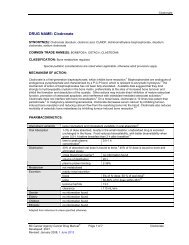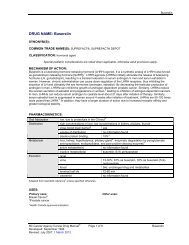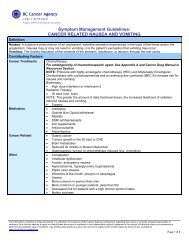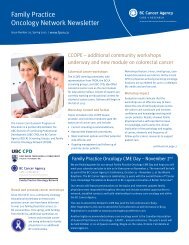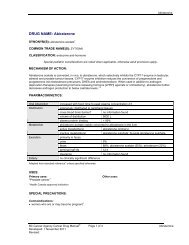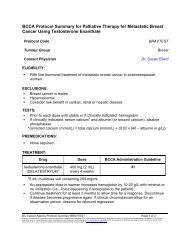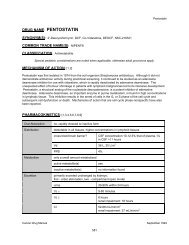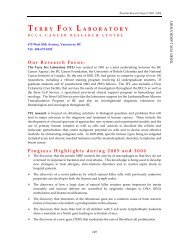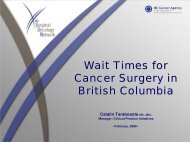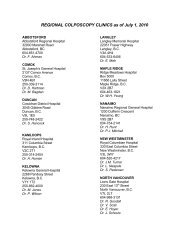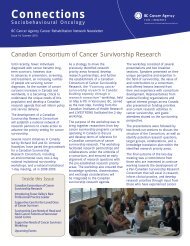CCSP manual - BC Cancer Agency
CCSP manual - BC Cancer Agency
CCSP manual - BC Cancer Agency
You also want an ePaper? Increase the reach of your titles
YUMPU automatically turns print PDFs into web optimized ePapers that Google loves.
Screening Recommendations continued<br />
Lesbians<br />
Research suggests that cervical cancer is found at a<br />
later stage among lesbians due to the widespread<br />
belief that lesbians don’t need Pap smears. This<br />
belief is untrue because:<br />
• Lesbians or their partners may have had<br />
consensual or non-consensual intercourse with<br />
men at some time<br />
• HPV in lesbians may be as prevalent as it is in<br />
heterosexual women<br />
Role of the Smear Taker<br />
All Pap smears submitted to the Cervical <strong>Cancer</strong><br />
Screening Program (<strong>CCSP</strong>) must be accompanied<br />
by the name of a licensed health care provider in<br />
British Columbia to whom the Pap smear result and<br />
follow-up letters can be sent. A “licensed health care<br />
provider” is a member in good standing of the <strong>BC</strong><br />
College of Physicians and Surgeons, the Association<br />
of Naturopathic Physicians of <strong>BC</strong> or a registered<br />
midwife designated by a woman as her primary<br />
health care provider. Certain nursing health stations<br />
in rural areas will also be acceptable if designated as<br />
primary health care providers.<br />
Smear takers play a key role in the <strong>CCSP</strong><br />
and are responsible for:<br />
• Identifying women for whom screening is<br />
recommended and maintaining appropriate call<br />
and recall systems.<br />
• Educating women about the benefits of screening<br />
while ensuring the limitations of screening are<br />
understood.<br />
• Educating women about the importance of<br />
regular smears.<br />
• Informing women of the need to seek medical<br />
attention for abnormal vaginal bleeding regardless<br />
of a normal smear result.<br />
• Ensuring women are referred for specialist<br />
assessment and investigation when required and<br />
coordinating their ongoing care.<br />
• Forwarding copies of smear results to a woman’s<br />
primary care giver (with her consent).<br />
The responsibility to follow up with<br />
individual women rests with primary care<br />
providers and should include:<br />
• Mechanisms to ensure a result is received for each<br />
smear taken.<br />
• Mechanism to inform the woman of the results,<br />
including normal results.<br />
• Protocols to ensure women are recalled as<br />
appropriate, for regular smears.<br />
• Protocols to ensure women with abnormal smears<br />
receive appropriate follow-up.<br />
4



